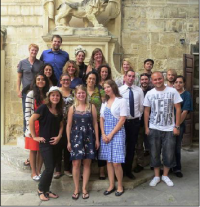Celebrating Four Years of CRAMS: Reflections on S-CAR's Dual Degree Program with the University of Malta
Celebrating Four Years of CRAMS: Reflections on S-CAR's Dual Degree Program with the University of Malta
 As the Mason community celebrates another milestone in global education with the opening of the Songdo Global University Campus in South Korea, S-CAR’s dual degree MSc program with the Mediterranean Academy of Diplomatic Studies (MEDAC) at the University of Malta is set to begin its fourth year. Malta’s commitment to international dialogue and its strategic location in the Mediterranean Sea make it a prime destination for those interested in studying issues related to conflict, peace, and diplomacy in the region. Situated between Southern Europe and North Africa, participants gain a unique international experience and insight due to their proximity to some of today’s most troubling situations, be it Egypt, Tunisia, Syria, or Greece.
As the Mason community celebrates another milestone in global education with the opening of the Songdo Global University Campus in South Korea, S-CAR’s dual degree MSc program with the Mediterranean Academy of Diplomatic Studies (MEDAC) at the University of Malta is set to begin its fourth year. Malta’s commitment to international dialogue and its strategic location in the Mediterranean Sea make it a prime destination for those interested in studying issues related to conflict, peace, and diplomacy in the region. Situated between Southern Europe and North Africa, participants gain a unique international experience and insight due to their proximity to some of today’s most troubling situations, be it Egypt, Tunisia, Syria, or Greece.
The MSc program in Conflict Analysis and Resolution and Mediterranean Security (CRAMS) merges the strengths of both universities. MEDAC’s core focus in diplomatic and security studies is brought together with S-CAR’s field defining blend of conflict analysis and resolution. As program co-coordinator Omar Grech notes, “The S-CAR/MEDAC dual degree program has enhanced the profile of conflict resolution in Malta and has evidenced the complementarity between the discipline and Malta's vocation as a promoter of dialogue and peace in the Mediterranean region.” The program is one of many initiatives undertaken by S-CAR in distance learning and continues the pioneering role the school has played in defining the standard for global education. Other initiatives include the new online MS Distance Learning Program, the experiential learning trips including those offered through the Center for World Religions, Diplomacy and Conflict Resolution (CRDC), and the student/faculty collaboration experiences developed as part of the Applied Practical Training (APTs).
S-CAR’s involvement with the creation of the CRAMS program was led from within and serves as yet another example of how Mason champions innovation. Former Dean Andrea Bartoli nurtured the inventive idea of Professor Richard Rubenstein to develop the program. Associate Dean for Administration Juliette Shedd provided the guidance and logistical support to set the program up and establish the academic standards required for it to bear the S-CAR name. On the Malta side, the Rector of the University of Malta, Prof. Juanito Camilleri, played an instrumental role in providing support and the institutional space for the initiative. A joint board of directors created from members of both institutions currently oversee the CRAMS program; S-CAR is represented by Professor Rubenstein and Professor Susan Hirsch, while MEDAC is represented by Professor Omar Grech and Professor Stephen Calleya, Director of the Mediterranean Academy of Diplomatic Studies. While in Malta, students receive support from Director of Graduate Student Services Erin Ogilvie-Hudson and Program Coordinator, Michael English who represents S-CAR on the ground in Valletta.
The CRAMS program is a yearlong intensive commitment broken down into three semesters. Students are required to complete 15 courses over the first two semesters and to use the third to produce a dissertation. Required courses mirror those of the domestic MS program but also include CONF 733: Legal Systems and Conflict and CONF 720: Conflict, Religion, and Reconciliation. From the MEDAC side the curriculum includes sessions on the relationship of conflict to issues such as human rights, the environment, media, and economics, all with a particular orientation toward understanding their impact in the Mediterranean region.
Thanks to the generosity of the University of Malta, the 2012-13 cohort participated in a trip to Cyprus to study firsthand the ongoing challenges with the peace process and reconciliation efforts on the divided island. Finally, students participated in a multi-day simulation exercise as a capstone to their experience, a project developed as part of S-CAR’s FIPSE grant sponsored by the U.S. Department of Education. The simulation, "Adding Fuel to the Fire: Energy Resources and International Negotiation in the Eastern Mediterranean," was authored by Post-Doctoral Research Fellow, Ned Lazarus and S-CAR PhD candidates Thanos Gatsias and Gul Mescioglu Gur.
For those interested in recommending the program to prospective students, please visit http://scar.gmu.edu/academics/maltaprogram. For a reflection on the student experience in Malta, see Jessica Lohmann’s piece at scar.gmu.edu/newsletter-subject/reflections-dual-degree-program-malta-0..




